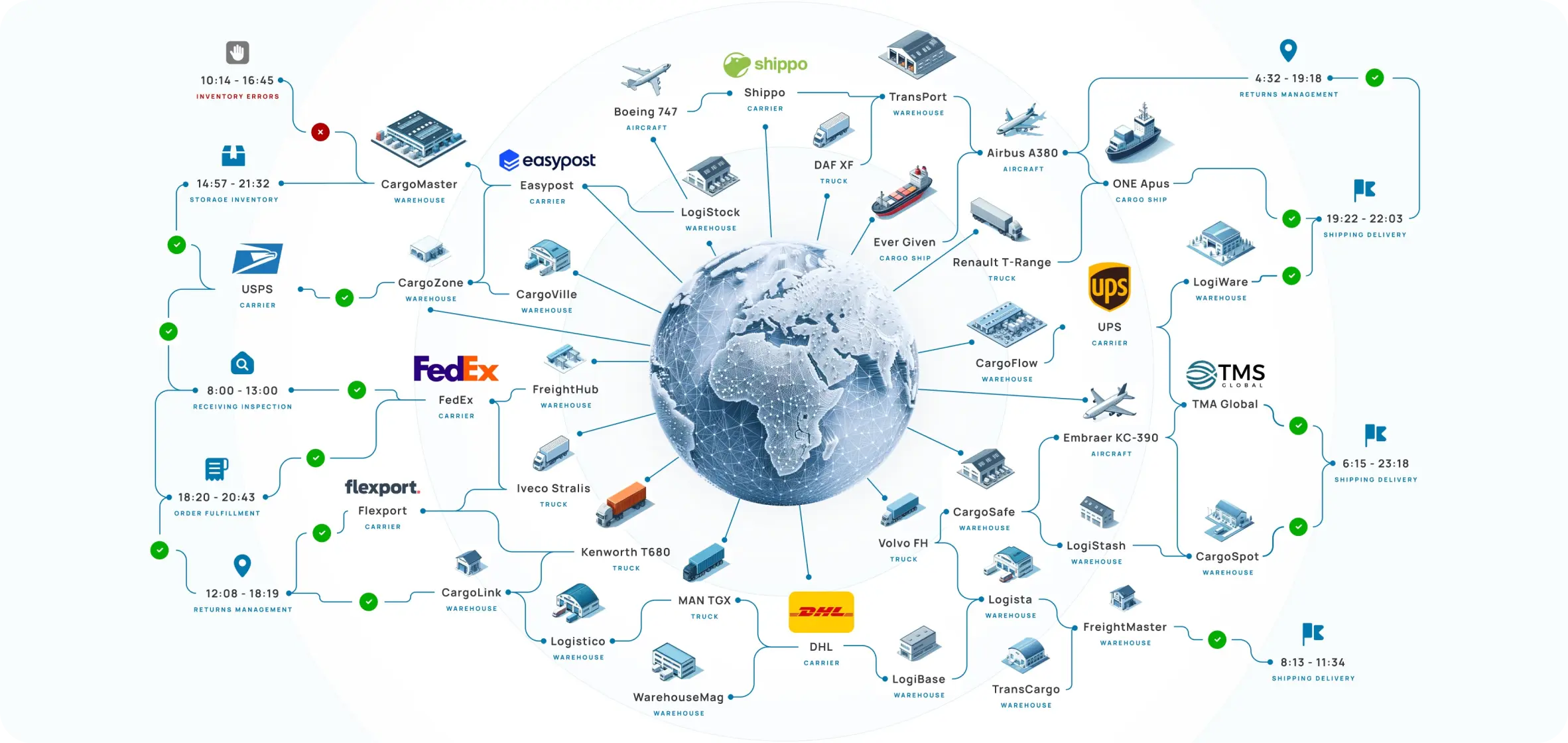Massive API integration project with 60+ shipping carriers worldwide for Global TMS

Client Story
Integration with shipping carriers is one of the most important business tasks for companies in the Supply Chain.
Erbis team recently helped our client with multiple carrier integrations, including the most well-known players like DHL, FedEx, USPS, DPD, UPS, C.H. Robinson, Flexport, Shippo, Omni Logistics, DSV, World Courier, ABF Freight System, Crane Worldwide and many others global and local companies (such as Czech Post, Blue Dart, etc).
- 60+ Carriers API integrated and maintained
- 30+ Countries covered
- $10M+ optimized costs for client and their customers per year
- 8 Erbis expertsSoftware EngineersBusiness Analyst Project ManagerQA Engineer
Challenge
While integrating with a single carrier is a straightforward process, the complexity multiplies when you need to integrate with multiple carriers, such as 10, 50, or 100.
Diversity. The diversity in integration standards (EDI, REST, SOAP, XML) and the varying IT infrastructure among carriers due to different investment levels and historical adoption of technology creates additional complexity during implementation. Carriers have different data models, shipment lifecycles, and services, making a one-size-fits-all approach impossible.
Different levels of technology adoption. Some carriers are adopting modern standards like REST in 2024, and many still do not have a web API, relying instead on older standards like EDI, which necessitates different integration approaches and complicates synchronous and asynchronous processing.
Lack of standardization and documentation issues. The lack of standardization across carriers' data models and APIs, combined with lacking in documentation, further complicates the integration process. This requires additional efforts in research and troubleshooting.
Continuous API updates. The ongoing development in IT and the need for carriers to upgrade their APIs results in issues like unannounced API changes, credential updates, and support for multiple API versions for different customers.
Non-Technical challenges. Varying international regulations and security concerns that requires consideration of legal and operational factors.
Solution
To simplify the development process and assure the highest quality, we outline several solutions and approaches:
- Asynchronous flows.
mitigates risks and decreases diversity by ensuring that, regardless of the communication protocol (EDI, SOAP, etc.), the data will eventually be collected. - Data model conversion.
Data model conversion. Converting the system's data model into an API request and reverse with the response, while handling errors effectively. This method simplifies the interaction with external endpoints, even though it may still present challenges in real-life applications due to potential slow responses or high load issues. - Handling high loads and API limitations.
Managing many shipments in real time can lead to high system load and potential carriers' API limitations.. While specific solutions to these issues are not detailed, the implication is that systems should be designed to efficiently manage load and gracefully handle API rate limits, possibly through queueing mechanisms, load balancing, etc. - Security and international regulations.
Comprehensive understanding of legal and security requirements is essential for successful integration. We follow the Governance, Risk Management, and Compliance (GRC) framework to ensure operating within legal and regulatory boundaries, maintaining a strong ethical stance, and managing risks effectively.
Additionally:
- Testing environments.
In order to ensure flawless integration, we create test environments for carriers that don’t provide their own. This helps to prevent any defects related to the most sensitive data (costs, permission-related functionality, and others).
Together with the support team our engineering team performs different tests before the solution becomes available for the client. This ensures a seamless user experience for the customers. - Enabled automatic bids.
Previously, the bidding process was manual, with users setting transportation bids and carriers applying manually. However, certain carriers have implemented rules for automatically accepting or rejecting bids, which can now be managed without human intervention. At Erbis, we fully support this automation and instantly display the auto bid status.
Implemented near real-time synchronization of shipment status.We implemented asynchronous background jobs to check the shipment status returned by the carrier. This allowed us to achieve a delay of no more than one minute when displaying the shipping status to the user. - Implemented a mechanism for interpreting errors from the carrier.
The user may enter incorrect data or leave certain fields blank when creating a shipment. In this case, the carrier returns an error, most often in an unreadable format. Our system interprets the error and translates it into human language so the user can quickly correct it. - Developed order management.
Some shipping providers offer a service where they take an order from a customer and divide it into separate shipping items. We have also implemented this feature in our SaaS platform. This means that when a customer places an order, they can send it to the carrier through our interface. The carrier will then create the shipping items and return them, and the order status will be automatically updated once the shipping is completed.
Tech stack
- AWS
- Angular JS
- Microservices
- Saas
- JAVA EE 7
- Oracle
The Results
Integration of numerous carriers allowed our client to offer their customers a competitive solution by enhancing efficiency, flexibility, and visibility in their logistics operations while also providing the tools needed to optimize shipping strategies and significantly reduce costs.
Our approach is designed to easily integrate with any shipping carrier, regardless of the data exchange protocol and data type it uses. Customers can choose from available shipping carriers and manage them using our platform.
In case a shipping provider is not yet supported by the system, customers can request integration, which takes 1 to 3 months, depending on the technical nuances on the provider’s side.
Fortune 500 companies are actively using the platform to transport their goods and products worldwide.
The importance and benefits of multiple shipping carriers API integrations:
- Rate Management and Cost Optimization
- Flawless Customer Service and User Experience
- Data-driven Analytics and Decision-making
- Real-time Shipments Booking and Tracking
- Enhanced Efficiency
- Efficient Documentation and Compliance
- Data Security
How we can help You
Our team has more than a decade of experience in the field of Supply Chain, and our expertise currently counts 60+ API integrations of shipping carriers. We can smoothly integrate any needed shipping carrier (global or local) into your system.
Having such a wide base of carriers allows clients to rate shipments across modes, service levels, and rates.
No matter the complexity, we're ready to address all your needs and challenges with state-of-the-art tech and custom approach assuring the best results and your business scaling.












